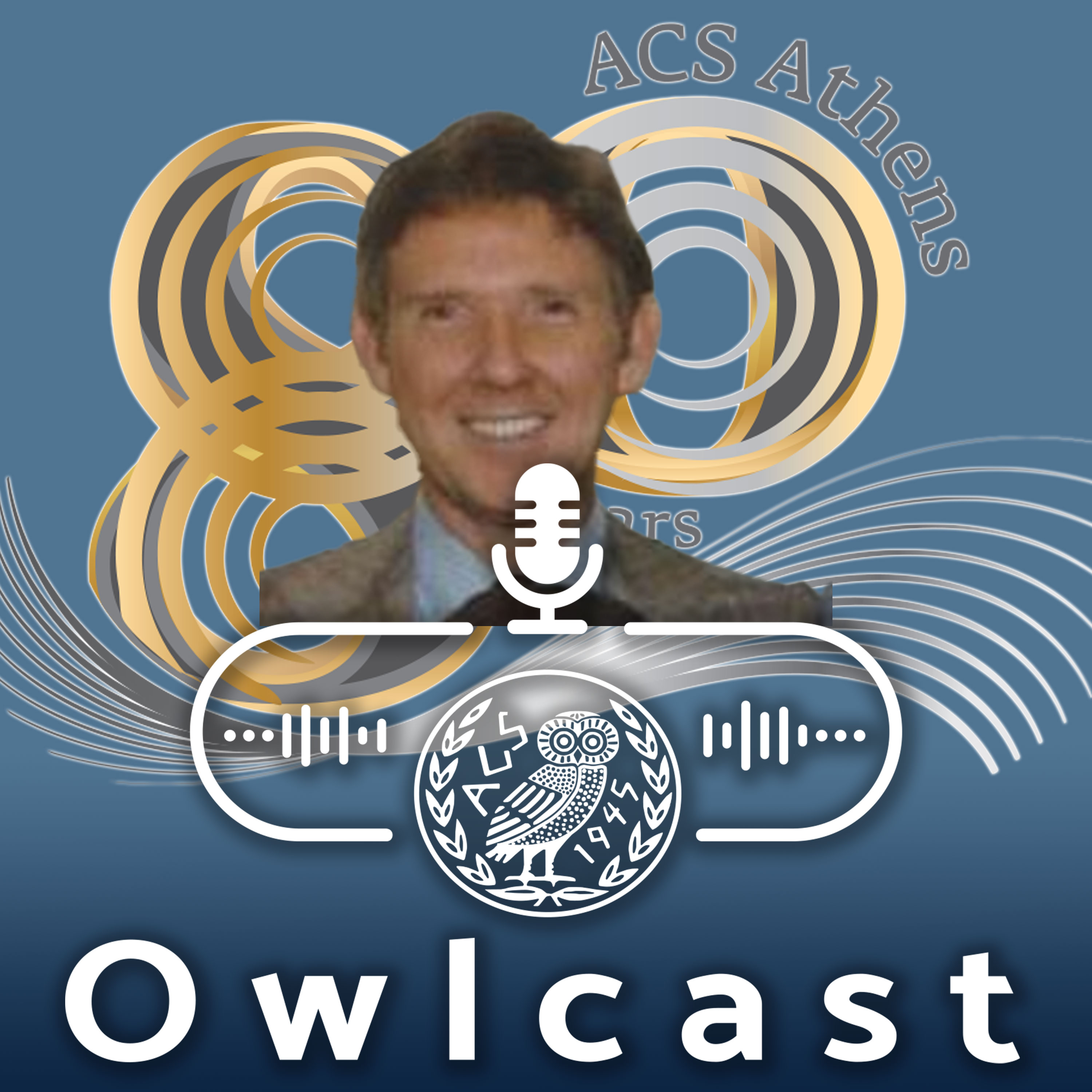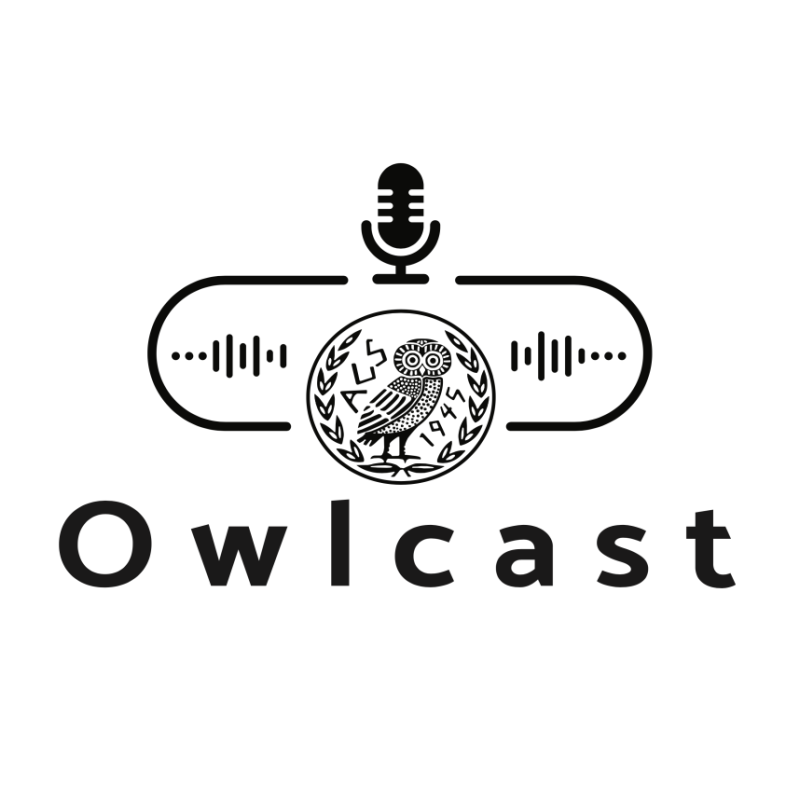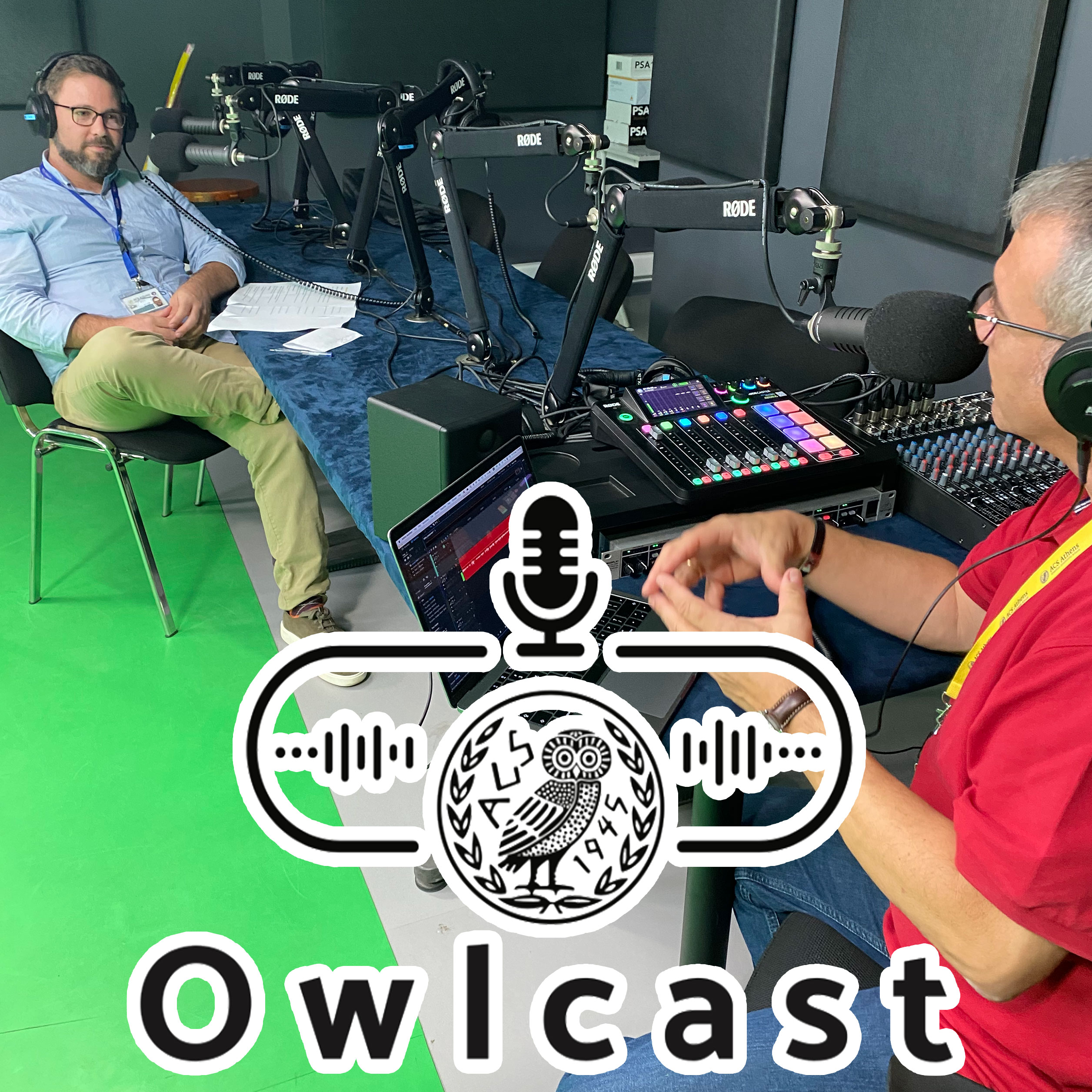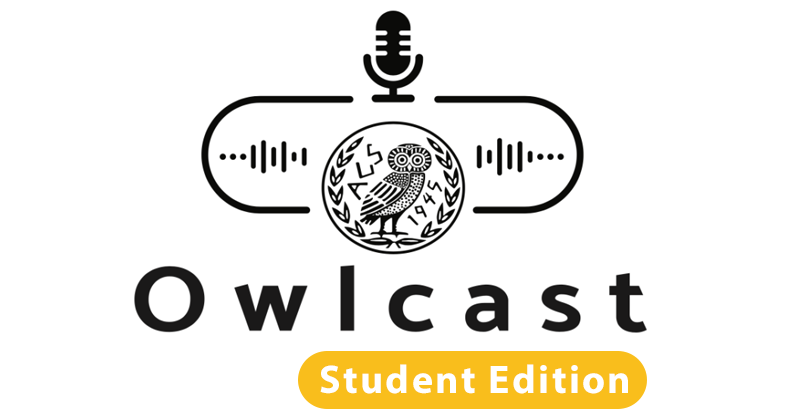Episode Transcript
[00:00:10] Speaker A: This is the owlcast, the official podcast of ACS Athens.
Listen to the exciting story of the American Community schools of Athens.
Check out what drives all the members of our international community of learners as we create
the education of the future.
Here's John Papadakis.
[00:00:56] Speaker B: Welcome to a special episode of Outcast where we embark on a journey
through the rich and transformative history of the American Community Schools of Athens, or as
we all know it for the past 20 years, ACS Athens over the past 80 years, ACS Athens has
evolved from a modest education institution serving the children of British military personnel into
a leading international school that embodies educational excellence and cultural diversity. In this
series, we'll explore some pivotal moments, moments that have shaped the school, guided by
the personal narratives of teachers, alumni, parents and community members who have
witnessed and participated in its development.
As ACS Athens celebrates this year its 80th anniversary, it stands as a testament to the vision
and dedication of its community.
The upcoming 2025 ACS Athens Gala and Alumni Achievement Awards scheduled for February
14, 2025 at the Hotel Grand Bretagne in Athens, will honor eight decades of academic
excellence and global citizenship. This milestone event reflects the school's enduring impact on
thousands of students who have grown into successful, conscious global citizens. Throughout
this year long Outcast series, we will hear from those who have been integral to the ACS Athens
journey. Teachers will share insights into the school's educational philosophies and their
experiences in fostering student growth.
Alumni will reflect on how their time at ACS Athens shaped their personal and professional lives.
Parents will discuss the school's role in their families and the broader community. These
narratives will provide a unique perspective on the school's evolution and its unwavering
commitment to nurturing responsible global citizens. The history of ACS Athens is a rich tapestry
woven with stories of resilience, innovation and community. From its humble beginnings in 1945
to its current status as a leading international school in Greece, ASIS Athens has continually
adapted to the changing educational landscape while remaining true to its core values as an
American education international institution. As we explore this 80 year journey, we invite you to
reflect on the enduring legacy of ASIS Athens and its role in shaping the minds and hearts of
generations.
The 1960s were a period of significant growth with the construction of key facilities that would
become central to the campus. In 1962, the middle school was established at its current
location, followed by the completion of the gymnasium in 1963. The expansion continued with
the erection of the first two stories of the annex building in 1964 to accommodate the elementary
school and further development of the elementary school facilities in 1968. These developments
not only enhanced the school's infrastructure, but also its capacity to serve a growing student
body. Today, Paul Cabanes, a beloved elementary school teacher who devoted more than two
decades to ASIS Athens starting in the mid-1960s, shares vivid memories of the close knit
community and vibrant traditions that defined the school during his tenure. He fondly recalls
colleagues such as Mary Papacifakis, Stan and Joanne Dimitru, and other dedicated educators
who worked tirelessly to nurture young minds. One highlight of those years was the annual
academic year kickoff celebrations at Kefalares American Club, a festive gathering that brought
teachers and staff together. These events were marked by the fun and elegant floating candles
in the pool that added a magical touch to the evenings. However, not all memories were without
challenges. Cabaniss reflects on the controversial Junta era regulations that imposed restrictions
on language institutes, as they were called, renaming them Fraudisteria Private Tutoring
Schools, which abruptly ended the school's free afternoon English language classes offered to
the broader community. Despite the obstacles, he emphasizes how the school's spirit of
resilience and camaraderie continue to shine through those turbulent times, leaving a lasting
impression on everyone involved. So let's open the pages of the ASIS Athens history book with
Paul Cabaniss.
What do you remember from the school, from your years? And tell me if you can, what years
you were here.
[00:05:55] Speaker C: I started off there in the third grade and I ended up in the fifth grade,
which I can't remember. I know that I was there during the junta, okay, but the year that I started,
I don't remember.
[00:06:11] Speaker B: So let's say late 60s, early 70s.
[00:06:14] Speaker C: Well, let's say middle 60s, middle 60s.
[00:06:17] Speaker B: Hunter was 67 to 74, if that gives you.
[00:06:22] Speaker C: That's right. So I was there during the Junta.
[00:06:24] Speaker B: So you came as a third grade teacher and you left?
[00:06:29] Speaker C: That's right.
[00:06:30] Speaker B: And do you remember how many years you stayed?
[00:06:34] Speaker C: I was there about 25 years.
[00:06:36] Speaker B: So in a sense, you left in the 80s.
[00:06:41] Speaker C: I left in the 80s.
[00:06:43] Speaker B: Can you give me an image of ACS at those years? I mean, I know that,
you know, the elementary school was built in the 60s, so it must have been a pretty new facility
at this point.
[00:06:56] Speaker C: When I started at ACS, there were only two buildings, what is now the high
school and the middle school. And then later on they built the administration building, which is
now part of the high school. But in the beginning there were only those two buildings. And then
they built the administration building. And the administration building was on the first floor. And
that's where the superintendent's office was and the admissions office. And then on the second
floor it was the, I think first and second grade. On the other building where the middle school is
now, there's grade three through sixth grade was over there.
And when you drive into ACS, on the side of the middle school, that used to be a gypsy field and
there were only gypsies out there with goats. It was a farm scene, but it was nice. And, you
know, we were right in the middle of the gypsy field.
[00:08:01] Speaker B: Yeah. Well, right now everything is covered with multi story buildings and
it's quite a residential area.
And the metro station is like two blocks away from us. So it's quite.
[00:08:13] Speaker C: Are you kidding?
[00:08:14] Speaker B: Yes.
[00:08:15] Speaker C: That's great.
[00:08:15] Speaker B: Yeah, yeah. The Metro is servicing all kinds of students coming to the
school because we're right next to it, in a sense, two blocks away. So it's very convenient. But at
those years, as you said, there was nothing around. It was just fields with goats. And someone
sent us a couple of photos that show that.
But we also have a few from our archive. So can you give me an idea of the work that you've
been doing in those years? In a sense, you know, technology was much, much different than
what it is today.
What?
[00:08:53] Speaker C: Yeah, when I started there, I started in the what is now the middle school,
and I was on the second floor with the third grade, and there were two of us in the third grade, so
two sections. Ms. Dantis was there on the one side and I was on the other side with the third
grade. So there were two third grades. And then right across from me was a lady that was at
ACS for a long time. Her name was Sophia Mesitis and she had the fifth grade. And that's how I
started there. And then after, I think one year or maybe two. You see, John, I'm old and my
memory is not what it used to be, but I was either in there one or two years on that middle
school building, and then they built the new elementary school. So if you can find out what year
that elementary school was built, I was transferred over there because even though it wasn't
complete, we were moved over there. They were still working on the building when we moved in.
[00:10:02] Speaker B: Yeah, what you're telling me right now, some news, because I had an idea
that the elementary school started operating when the building was complete. You're telling me
now that the second floor of the administration used to be some classes of the elementary
Correct.
[00:10:21] Speaker C: That's right. Well, that's after, of course, the new elementary school was
built. Do you know what year that school was built? I can't remember.
[00:10:31] Speaker B: It is on our website because we have some kind of a timeline, but this is
extraordinary.
[00:10:37] Speaker C: Well, when we moved in there, they were still, of course, it was enough
completed for us to have our classes. But at that time, all the elementary school was housed in
that building.
[00:10:51] Speaker B: Yeah, yeah. And from these years now, do you have anybody in your
memory? You mentioned a couple of names. Do you remember someone that stayed as long as
you did or that you were friends with? Do you remember anybody?
[00:11:07] Speaker C: Oh, there were so many that. And of course, don't forget that ACS at that
time operated the elementary school at the Hellenic Air Force base in Hellenicon.
And so some of our colleagues were down there in that school. But I remember so many
wonderful friends, of course, and I tried to list some of them, but I didn't list their. Mary Papasifakis. She was there. And Stan Dimitrov was there, his wife, Joanne Dimitro, they were there.
And I remember so many of the colleagues that I had. A lot of them have passed on, but we had
a wonderful staff at that time.
[00:11:59] Speaker A: You are listening to the owlcast, the official podcast of ACS Athens.
[00:12:15] Speaker B: Anything specific from the activities? Something that, I mean, when you
think of ACS, what comes to your mind?
[00:12:24] Speaker C: Well, I think one of the things that made me so happy at ACS was ACS
offered an opening for our, let's say, a beginning of school celebration in September. And it was
held at the old American Club in Kefaladi. And that American club had a beautiful swimming
pool. And I remember the floating candles on that swimming pool and the wonderful music and
the food and the camaraderie that we shared. ACS also at that time offered a community service
program and they had, they taught English as a foreign language in the evening. They had
afternoon classes of typing and shorthand and one or two other subjects that I don't remember
that was. I remember the typing in shorthand because I did that.
[00:13:22] Speaker B: This is for the community, right? That's. That's for the outside.
[00:13:26] Speaker C: They had a community service and with the esl, the after, you know, in
the evening. Yeah. Finally the, at that time that they were called language institutes, the
government finally, I think under Papadopoulos, they had to change from institute to Frontisteria.
So the Frontisteria there in Ayupatiscope and Halandri didn't like that ACS was giving free
English lessons. So ACS in order to have peace in the community, stopped giving those lessons.
[00:14:03] Speaker B: Well, I knew that story, but I didn't know exactly how it stopped being an
institute and went to fraudistirio and why we were not allowed at that time to operate. Because,
you know, there are still questions in the community here. Why don't we offer English as a
second language to the community? And I knew that there was a reason. So now you told me
the reason.
[00:14:27] Speaker C: Well, the reason was, at that time, the owner of.
First of all, about the front studio. When Papadopoulos came into power in 1967, one of the first
things that he did was said, you can't have the word institute. They have to be called.
That was from the government. That's how that came about.
[00:14:51] Speaker B: Yeah.
[00:14:51] Speaker C: And as I said, it's a shame with ACS, the beautiful facilities that they have
and the expertise that they have in teaching. It's a shame that they do not offer the courses. But
that's the reason why, when I was there, they stopped because of the franchise owners in Aya
Paris and a laundry. They asked ACS to stop and ACS did. To have good relationships with the
community.
[00:15:23] Speaker B: Paul, after you left ACS in the 80s, you said sometime.
[00:15:29] Speaker C: Yes.
[00:15:29] Speaker B: Did you go back to teaching in the States? I mean, what, what, what did
you do after?
[00:15:34] Speaker C: No, after I left ACS, I did two things. I started working for the University of
Indianapolis, which had a branch there. And, you know, at that time, there was confusion about
what the Greek government accepted as a university and what they didn't. But we had a lot of
students there at University of Indianapolis. And John, I'm not sure. Are they still in Athens or
has that closed?
[00:16:02] Speaker B: University of Indianapolis used to be in Athens until, I think, 2014.
So they stopped their operation in 2014?
Yeah, but I. I didn't know.
[00:16:14] Speaker C: Well, they were. Their art headquarters was on Voulis Street.
[00:16:18] Speaker B: Okay.
[00:16:19] Speaker C: In downtown Athens. And I taught there for, I guess, maybe four years or
even five years. I taught English. And then after that, I had a friend of mine, I continued to work
in the tourist business. So I had.
From teaching, I went into the tourist business.
[00:16:44] Speaker B: So in the States, you returned? When?
[00:16:46] Speaker C: I returned to the United States in 2011.
[00:16:50] Speaker B: 2011. Okay.
Wow, this is a nice review of what you did. I don't want to keep you longer than it needs to be,
but I do need to have you give us a message for the 80th anniversary of the school. This is the
80th year of operation since 1945. And we have the class of 20, 25, graduating in June. So if
you could give us something to think about when we celebrate the 80th anniversary, what would
that be, what your wish would be?
[00:17:27] Speaker C: Well, it's sort of hard to put it in words, but first of all, I owe a lot to ACS,
and I think a lot of other people do, too.
I was allowed there to retire at a young age, and they also gave me a chance to get a master's
degree from their scholarship program. And so ACS has a lot to offer, and if they continue to
offer what they did when I was there for the future, it would be wonderful. And the students, of
course, benefit greatly from going there and having an interchange with so many different
nationalities and languages. It's a wonderful school. And I'm sure that for the next 80 years,
they're going to remain wonderful.
[00:18:16] Speaker B: Thank you, Paul. Paul Cabaniss, one of the people that created the legacy
of ACS Athens. Thank you for connecting with us from Dallas, Texas.
Wish you all the best and hopefully we're gonna see you soon at the campus whenever.
[00:18:32] Speaker C: Okay, well, thanks a million, John. I really appreciate it.
[00:18:35] Speaker B: Thank you, Paul.
[00:18:36] Speaker C: Have a wonderful evening.
[00:18:37] Speaker B: Take care. Bye. Bye.
[00:18:40] Speaker A: You are listening to the owlcast, the official podcast of ACS Athens. Make
sure you subscribe to the Owlcast on Google Podcast, Spotify and Apple podcasts. This has
been a production of the AC Athens Media Studio.



